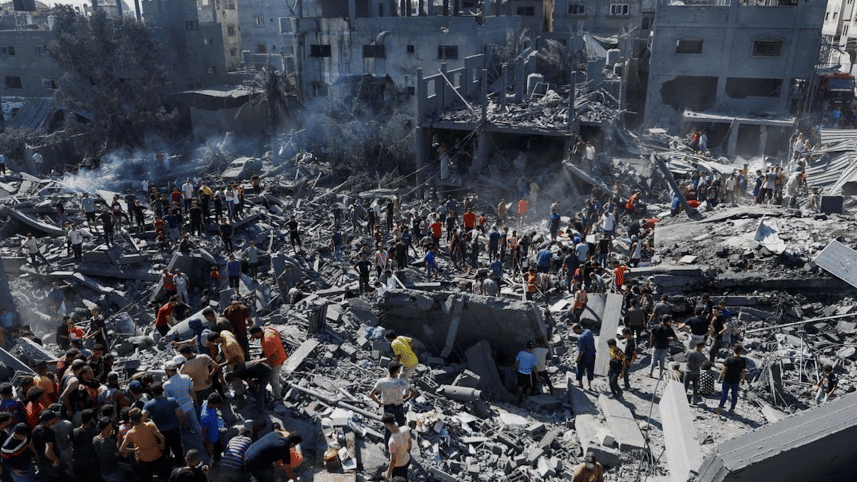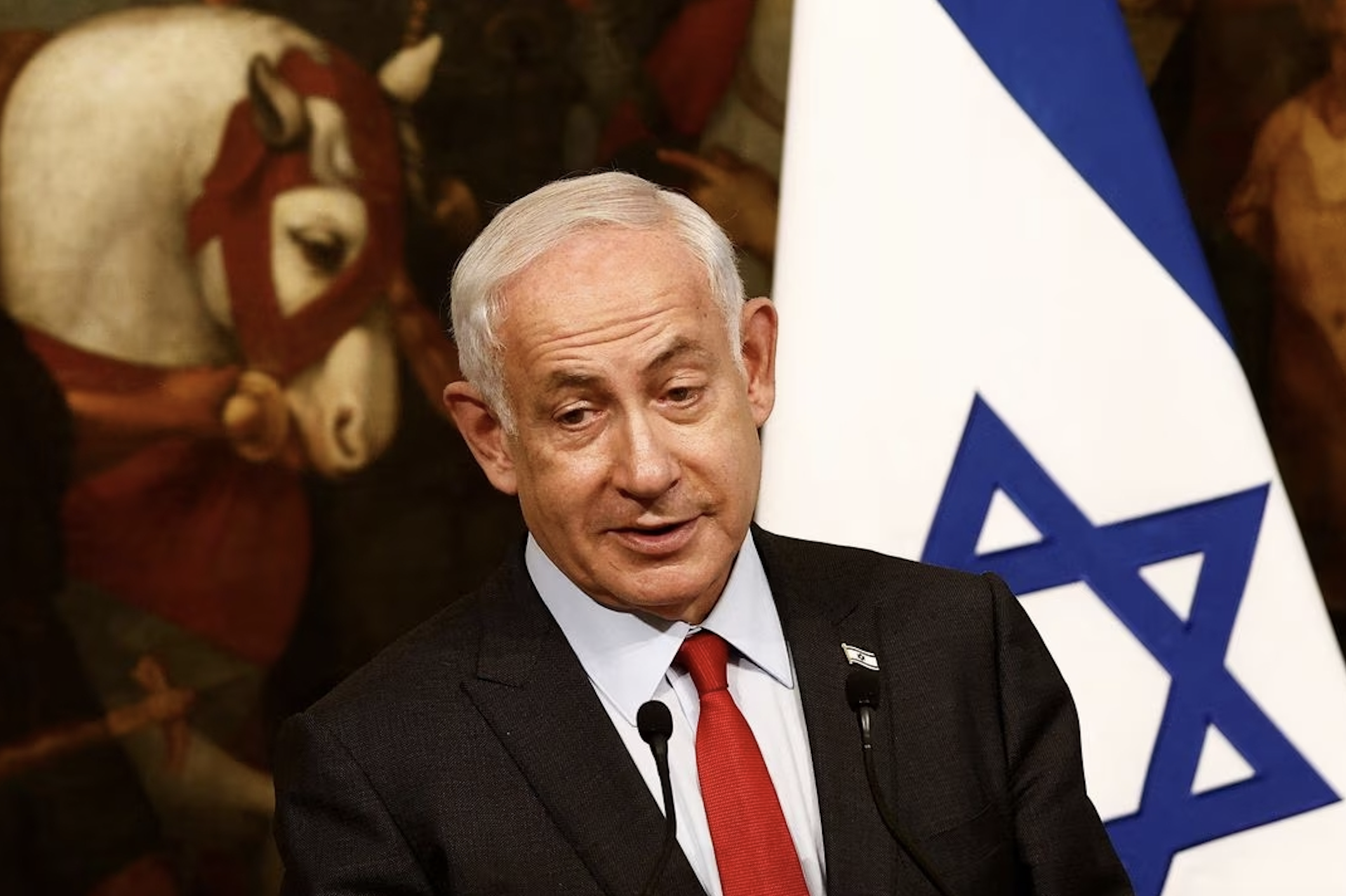The Arab League is not doing enough to save Gaza

Since the Hamas attack on October 7, Israel has carried out relentless bombardment on the Gaza Strip. Some have already marked Hamas' step as the "New Intifada"—this time an armed retaliation against the backdrop of Israeli forces inhumanely oppressing the Palestinians for decades. While Israel and its closest allies at first condemned only the Hamas attack, most of the global community, including the United Nations secretary-general, mentioned the unlawful Israeli occupation of Palestinian lands. The UN General Assembly passed a non-binding resolution calling for "humanitarian truce" on Friday while Israel expanded its ground invasions in Gaza on Saturday. Given the harsh reality of a lopsided war—regular Palestinians against the most advanced military force in the Middle East—the situation has already spiralled beyond imagination.
According to the health ministry in the Hamas-run Gaza Strip, Israel's non-stop bombardment has killed more than 7,000 Palestinians, including 3,000 children, and turned Gaza's desperate situation into a "catastrophe." UN Secretary-General Antonio Guterres said the indiscriminate nature of the Israeli military offensive was a clear violation of international law. Israel is also accused of using "starvation as a weapon" against the civilians in Gaza, as only two percent of the usual food has been delivered since Israel's total siege.
In such a context, the response from regional members, that is the Arab countries, still remains inadequate. Although some neighbouring countries like Qatar and Iran have taken some notable diplomatic initiatives, so far those initiatives have not brought any satisfactory result for the people of Gaza, who are experiencing the worst possible humanitarian threat at the moment. The Arab League, an intergovernmental pan-Arab organisation founded in 1945, includes 22 Muslim-majority countries in the Middle East and North Africa. It is committed to establishing Palestine as an independent state, protecting the sites in Jerusalem against Israeli violations, and opposing Israel's use of violence and its blockade of Gaza. Israel's ongoing airstrikes have brought the role of the Arab League into the forefront, as many are expecting it to take initiatives to put an end to all forms of violence against Palestinians and restore peace and stability in the Palestinian territories.
The Arab League urged for "an immediate halt to military operations" on Gaza and "the cycle of armed confrontation between the two sides." Arab leaders condemned Israel's bombardment of Gaza, demanded renewed efforts to end the decades-long cycle of violence, and called for the de-escalation of Israel-Hamas war at Cairo Peace Summit held on October 21, amid growing fears of a wider Middle East conflict. Almost all of the regional actors such as Qatar, Saudi Arabia, Syria, Iraq and Kuwait placed the blame for violence on Israel and called for an immediate de-escalation. The United Arab Emirates (UAE) and Bahrain initially condemned the Hamas attack, while Egypt warned of "dire dangers of the ongoing escalation between the Palestinian and Israeli sides." Qatar, one of the significant actors in the Arab League, is attempting negotiations on a ceasefire and prisoner exchange deal between Israel and Hamas.
It's notable that normalisation of diplomatic ties with Israel without the complete withdrawal of Israeli forces from Arab lands captured since 1967 has been a complete violation of the Saudi-led Arab Peace Initiative, endorsed by the 22 members of the Arab League in Beirut in 2002. It also undermines the long-standing favourable policy of Arab countries towards the Palestinian cause. While Jordan and Egypt normalised relations with Israel long before, Morocco, UAE and Bahrain did so under the Abraham Accords, signed in late 2020. Accordingly, there was a prospect for a deal to normalise relations between Saudi Arabia and Israel in September this year. But that has been halted amid the ongoing conflict.
Such kind of diplomatic moves seem to largely facilitate Israel's annexation of Palestinian territory, jeopardising not only the establishment of an independent Palestinian state but also the stability of the whole Arab region. These normalisation deals, brokered by the US, can significantly halt the withdrawal of Israeli forces from occupied territories and the end of Israeli occupation, which essentially gives the green light for Israel's atrocities against the Palestinians. Given this concern, Hamas, the elected ruler of Gaza, sees the normalisation as the "betrayal" of those Arab countries to the Palestinian cause. It's also noteworthy that majority of ordinary citizens in Arab states have shown their disapproval towards normalisation; over three quarters of the Arab public agree that normalisation defeats the Palestinian cause, which concerns all Arabs and not Palestinians alone, according to survey conducted in 2020 by Qatar-run Arab Center for Research and Policy Studies. Besides, the world has also witnessed Israeli attacks in Syria, Lebanon, Sudan, Iraq, Yemen and other parts of the Arab region, destabilising the Middle East and beyond. Amid the war with Hamas, Israel has carried out airstrikes in Syria, Lebanon and Egypt as well.
This escalation calls for strong and visible cooperation among the members of the Arab League to end Israel's military assaults on the Gaza Strip and other parts of the region. Essentially, the organisation needs to work for the fundamental cause on which it was founded. The member states need to completely boycott Israel unless it stops this unrelenting cycle of violence. Only condemnation of Israeli military assaults cannot bring any immediate solution to the conflict. Israel's repeated cruel actions call for unconditional support and stronger intervention by Arab regimes for the Palestinians, so that they can secure their basic human rights.
Sultana Yesmin has completed her PhD in international relations from the Central China Normal University in Wuhan, China.
Views expressed in this article are the author's own.
Follow The Daily Star Opinion on Facebook for the latest opinions, commentaries and analyses by experts and professionals. To contribute your article or letter to The Daily Star Opinion, see our guidelines for submission.



 For all latest news, follow The Daily Star's Google News channel.
For all latest news, follow The Daily Star's Google News channel. 

Comments